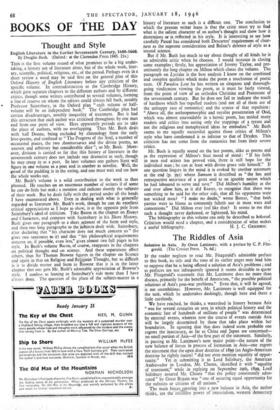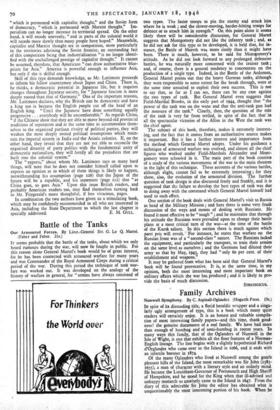The Riddles of Asia
Solution in Asia. By Owen Lattimore, with a preface by C. P. Fitz- gerald. (The Cresset Press. 7s. 6d.)
IF the reader neglects to read Mr. Fitzgerald's admirable- preface to this book, its title and the tone of its earlier pages may lead him to suppose that he is being offered a solution of Asia's problems ; and as prefaces are not infrequently ignored it- seems desirable to quote. Mr. Fitzgerald's statement that Mr. Lattimore does no more than discuss, primarily for the benefit of Americans, "the possible political solutions of Asia's post-war problems." Even that, it will be agreed, is not unambitious. However, Mr. Lattimore is well equipped for the task, which he undertakes dashingly, though here and there a little carelessly.
We have reached, he thinks, a watershed in history because Asia "was for several centuries an area in which political history and the economic fate of hundreds of millions of people" was determined by external events, whereas now the course of events outside Asia will be largely determined by those that take place within her boundaries. In agreeing that that does indeed seem probable one regrets the inaccuracy, as far as China and Japan are concerned— no small portion of Asia—of the first part of the statement. Similarly, in passing to Mr. Lattimore's next major point—the nature of the new balance of forces in process of formation in Asia—one regrets the statement that the open door doctrine of 1899 (an Anglo-American doctrine he rightly insists) "did not even mention equality of oppor- tunity." Yet in submitting it to Lord Salisbury, the American Ambassador in London, Mr. Choate, identified it with "equality of treatment," while in replying on September 29th, 1899, Lord Salisbury assured Mr. Choate that the policy consistently advo- cated" by Great Britain.was "one of securing equal opportunity for the subjects or citizens of all nations."
The main for,cesjatering into a new balance in Asiaz the author thinks, are the retentive power of' imperialism, western ;democracy
"which is permeated with capitalist thought," and the Soviet form of democracy, "which -is permeated with Marxist thought." Im- perialism can no longer increase its territorial spread. On the other hand, it will recede unevenly, "and in parts of the colonial world it will recede more slowly than many people have hoped." Meanwhile, capitalist and Marxist thought are in competition, more particularly in the territories adjoining the Soviet frontier, an outstanding fact of this competition being that industrialisation "is no longer identi- fied with the unchallenged prestige of capitalist thought." It cannot be assumed, therefore, that Americans "can draw authoritative blue- prints for Asia." America is powerful enough to influence Asia, but only if she is skilful enough.
Skill of this type demands knowledge, so Mr. Lattimore proceeds to inform his fellow countrymen about Japan and China. There is, he thinks, a democratic potential in Japanese life, but it requires changes throughout Japanese society, for "Japanese fascism is more deeply rooted-than that of Germany." One of the important reasons, Mr. Lattimore declares, why the British can be democratic and have a king too is because the English people cut off the head • of an English king. "Until the Japanese have done something equally progressive ... everybody will be uncomfortable." As regards China, "if the Chinese show that they are able to move beyond old provincial traditions of separatism and at the same time to accommodate them- selves to the organised partisan rivalry of political parties, they will weaken the most deeply rooted political assumptions which main- tain the imperial system in India and the Asiatic colonies. If, on the other hand, they reveal that they are not yet able to reconcile the organised disunity of party politics with the fundamental unity of democratic nationalism, they will fortify all the prejudices that are built into the colonial system."
The "experts," about whom Mr. Lattimore says so many hard things, will note that he does not consider himself called 'upon to express an opinion as to which of these things is likely to happen, notwithstanding his assumption (page 126) that the Japan of the future will be a republic, and his statement (page 112) that "as China goes, so goes Asia." Upon this issue British readers, and probably American readers too, may find themselves turning back to Mr. Fitzgerald's more thoughtful, if less vivacious, pages.
In combination the two authors have given us a stimulating book, which may be confidently recommended to all who are interested in Asia, including the State Department to which the last chapter is specially addressed. E. M. GULL.



























 Previous page
Previous page